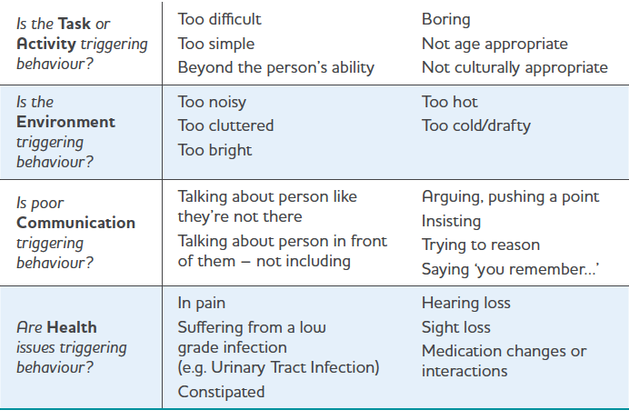Understanding Dementia Behaviours
Scroll to Explore

Challenging behaviour is often a person’s best attempt to communicate their feelings when words are not working anymore or can be a reaction to something that is not right for an individual and generally occurs when there is a need that is not being met. The need doesn’t have to be a physical one, but may be emotional or spiritual, such as the need for respect, love or happiness. The need might be something said or unsaid; something done or not done. Always remember to ask:
- What is this person trying to communicate?
- What is the need that is not being fulfilled?
There are many reasons why a person’s behaviour may change. Dementia is a result of physical changes in the brain, and these can affect the person’s memory, mood and behaviour. Sometimes, behaviour may be related to these changes, but at other times, the behaviour may be triggered by changes in the person’s environment, health or medication. Trying to make sense of why the person you care for does something can be hard.
If you’re able to understand the cause of behaviours this will help you to decide which strategies to use. Keeping a diary may also help you to see any patterns of behaviour that may be developing, and this will help you to identify the cause of the changes.
Not everyone with dementia will show any or all of these behaviours, but some behaviours that may occur for people with dementia are:
- Agitation (irritability, restlessness, fidgeting)
- Aggression (physically and/or verbally threatening behaviours)
- Anxiety (worried thoughts, fearfulness, insomnia, muscle tension, headache, repeated requests for assistance)
- Apathy (lack of interest)
- Depression
- Disinhibited behaviours (doing or saying embarrassing things in public, sexual behaviours)
- Sleep difficulties
- Psychotic symptoms (hallucinations, delusions)
- Vocally disruptive behaviours
- Wandering
You may not always be able to stop or change these behaviours, but learning what triggers certain behaviours, and learning to react supportively instead of emotionally, will be the most helpful. Approaching the situation calmly and focussed on the goal will help.
Triggers Or Causes Of Behaviours
Behaviours are the person’s attempt to communicate their feelings and unmet needs. Factors relating to task and activities, environment, communication and health can cause feelings of anger, frustration, being overwhelmed or embarrassed. The table below shows common triggers that may help you work out what is causing a behaviour.

Behaviours are often related to a feeling. It is important to understand that a person with dementia may not be able to say what they feel in words as well as they used to. This behaviour may be their best attempt to communicate how they are feeling.
Speak to someone
Talk with us about being involved with our Stronger Carers program, and other ways we can support you to care for yourself and your loved ones. Call us on 1300 275 227.